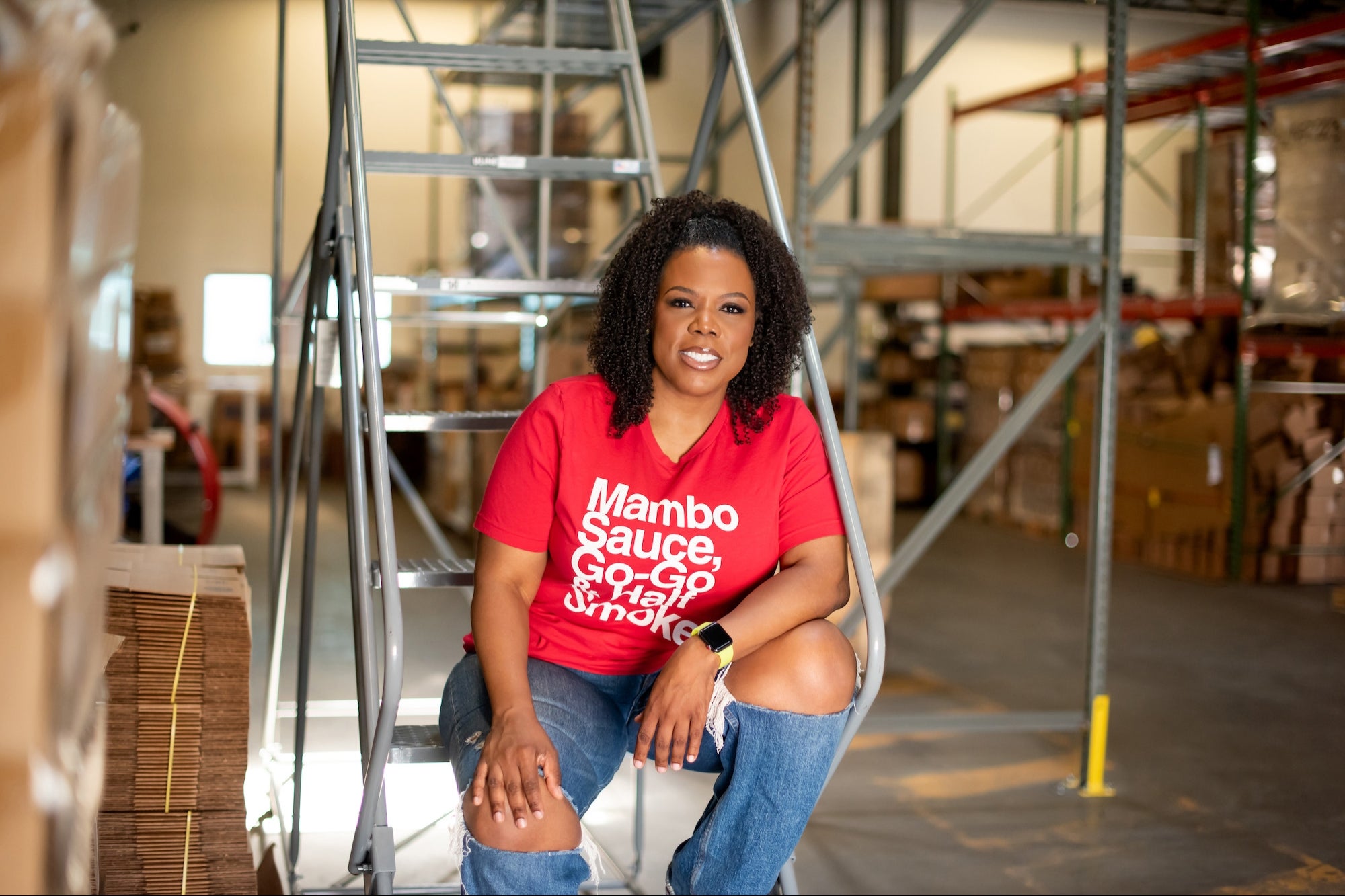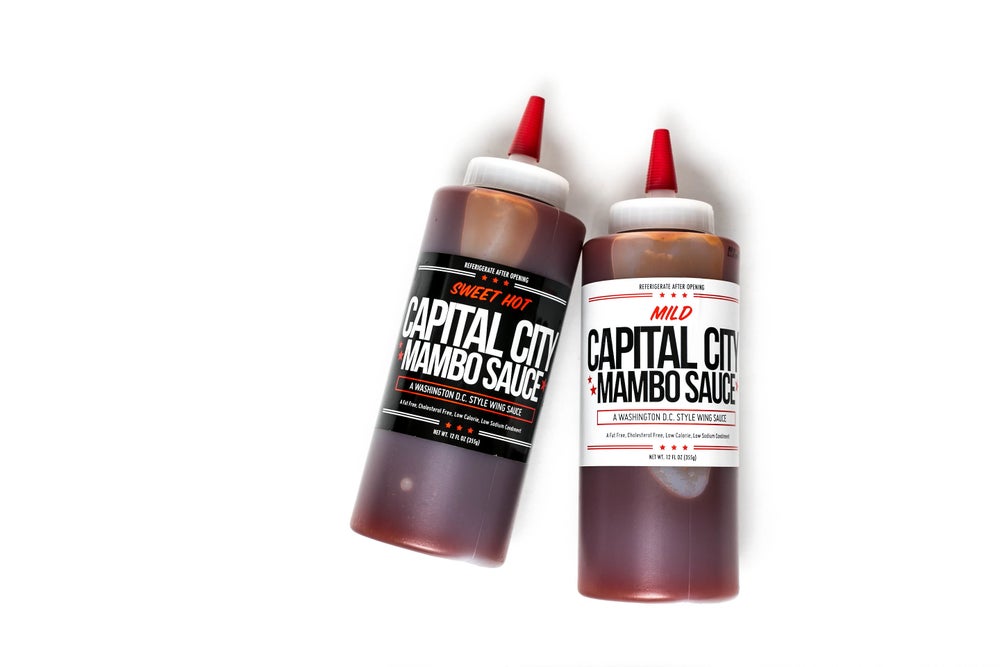Investing
How She Started a Multimillion-Dollar Business From Home

When Arsha Jones was pregnant with her fourth child, one of her biggest cravings was chicken wings with mambo sauce, a sweet, tangy condiment that gained popularity decades ago at takeout restaurants in Washington, D.C. “It was my husband’s job to either drive me into D.C. about 30 minutes [away], or he had to bring it back to our home,” Jones tells Entrepreneur.
Image Credit: Courtesy of Capital City Mambo Sauce. Arsha Jones.
Jones had grown up enjoying mambo sauce in the 1980s and 1990s. It was “something that was just part of the community,” she recalls, with origins in the area dating back to the late 1960s, when Wing-N-Things, a Black-owned restaurant located on 7th and Florida Ave NW, helped popularize it.
Related: She Launched Her Black-Owned Beauty Brand with $1,500 in Her Pockets — Now Her Products Are on Sephora’s Shelves
Eventually, Jones’ hankering for mambo sauce became a little inconvenient, so she decided to make it herself. “About every two weeks, I had this one pot that I used, and I’d make enough mambo sauce for one meal. And that was it; that was enough to satisfy my cravings,” she says.
“I pulled up a website and started immediately selling online.”
In those early days, Jones wasn’t trying to start a business. She batched the sauce for her family’s enjoyment — not with the goal of developing a marketable product. However, with a background in website design and ecommerce, it wasn’t long before Jones began to wonder if there might be other people out there who wanted easy access to mambo sauce.
So, in 2011, Jones and her husband, Charles, launched a direct-to-consumer business: Capital City Mambo Sauce.
“We’d never intended this to be a retail product,” Jones says. “I would even argue that back then, there was a harder path to get smaller brands onto grocery store shelves than it is today. Today, there are so many programs and accelerators and things — back then, there was none of that. It wasn’t even a consideration. I pulled up a website and started immediately selling online.”
Related: Shop with Purpose: Supporting Black-Owned Businesses for National Black Business Month
Jones didn’t grow up in a family of entrepreneurs and says she was on her own when it came to figuring out how to grow her small, home-based business. Without outside money to fund her venture or an extensive network to tap into, she took a grassroots approach instead. Jones scanned grocery shelves for small bottled brands, “like a local barbecue sauce,” and then sent their owners an email.
“I would say, ‘How did you do X? And how did you get on the store shelf?'” Jones explains. “And they would just sit down and answer any kind of questions that I had. And that was really how I jumped over a few of those hurdles, at least in the beginning.”
“One thing about not having resources…is that you just learn to do a lot of these things yourself.”
First, Jones focused on getting Capital City Mambo Sauce in small retail stores within the community. “I heavily relied on smaller grocery stores,” Jones says. “Washington, D. C. is a place that doesn’t have many grocery stores, so people rely heavily on these small mom-and-pop-style convenience stores — corner stores, we call them. They’re similar to New York bodegas.”
Capital City Mambo Sauce was sold in 15 mom-and-pop shops, and positioning the product in those small retailers proved successful: Large grocery stores took notice when customers asked why the sauce wasn’t available on their shelves. That led local retailer Shoppers Food to reach out to Capital City Mambo Sauce — and ask what it would take to stock the in-demand product.
 Image Credit: Courtesy of Capital City Mambo Sauce
Image Credit: Courtesy of Capital City Mambo Sauce
From there, the business continued to grow, ultimately transforming into a seven-figure brand available in more than 3,000 nationwide retailers, including Walmart, Wegmans, Safeway, Costco and more.
Related: When Her Small Business Was in Crisis, She Started a Side Hustle — Then ‘Took a Long Shot in the Dark’ That Got Walmart’s Attention
Capital City Mambo Sauce continues to grow consistently at a rate of 25% year over year thanks to a multi-pronged retail strategy that extends to fast-food chains and sports arenas. The brand boasts partnerships with Papa John’s, KFC, The Washington Commanders at FedExField and D.C. United at Audi Field.
Each retail partnership brings its own set of rules and regulations, which can be challenging, but Jones’ self-starter mentality has helped her navigate them successfully. “The learning curve is very steep,” she says. “[But] one thing about not having resources, access and financial backing is that you just learn to do a lot of these things yourself. That’s what me and my team did. We got a manual from Target that was 30 pages. We read all 30 pages until we understood the processes completely.”
“We have our own culture, our own slang, our own style and, of course, our own food.”
Capital City Mambo Sauce began as a family business with just a husband-and-wife team of two — and some help from their four sons — which helped establish a strong foundation for the brand’s continued success, Jones says.
“I know it sounds really cliche, but we really do all feel like family,” Jones explains. “And because of that, we operate in a manner where we all respect each other. There are values that we hold dear, and we’re always moving forward together in unison and making sure that everyone’s voice is heard, everyone gets considered and everyone’s treated fairly. That has been a benefit for us because everybody’s here because they genuinely love what they do.”
Related: These Values Help Family Businesses Survive and Thrive in Tough Times
Now, Jones looks forward to sharing Washington, D.C. with the world. She wants to dismantle the notion that it’s just a place of politics and tourism — and use mambo sauce to draw attention to the city’s vibrant community and culture.
“When you’re a resident here, [museums and monuments] are not the things that we think about,” Jones says. “We have our own culture, our own slang, our own style and, of course, our own food, which largely gets hidden because of everything else that’s going on. So the one thing that I’m excited about is making sure that people outside of Washington, D.C. get a chance to get to know who we are.”
Read the full article here

-

 Side Hustles7 days ago
Side Hustles7 days agoWhy the Best CEOs Think Like Anthropologists
-

 Side Hustles5 days ago
Side Hustles5 days agoThis User-Friendly H&R Block Software Package is Only $40, While Supplies Last
-

 Investing5 days ago
Investing5 days agoTikTok faces US ban deadline as users brace for fallout By Reuters
-

 Passive Income4 days ago
Passive Income4 days agoTrain for a New Tech Career in 2025 With This $25 Course Bundle
-

 Personal Finance6 days ago
Personal Finance6 days agoDecember inflation clouds Fed's outlook on interest rate cuts
-

 Personal Finance7 days ago
Personal Finance7 days agoCalifornia's homeowners insurance industry faces rough road ahead as wildfires continue
-

 Investing7 days ago
Investing7 days agoWhy Not Owning Bitcoin is Making You Poor
-

 Side Hustles6 days ago
Side Hustles6 days agoSupreme Court TikTok Ban: What to Know, January 19 Deadline


















